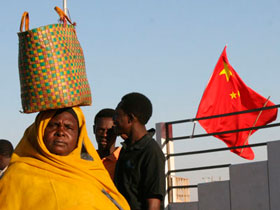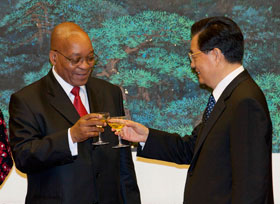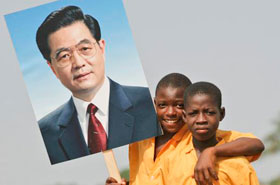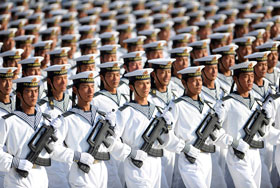China is conquering Africa
Angolan and chinese engineers
In
Login if you are already registered
(no votes) |
(0 votes) |
PhD in History, Leading Researcher at RAS Institute for African Studies
In the last decade, we have witnessed China’s unprecedented activities in Africa. China is successfully squeezing old players in the African markets, it is leading among the new players, which gain powers in the continent, in particular, the BRICS countries. What drives China to strengthen its efforts on the continent? What does Africa gain from Chinese policy and what in that policy Africans are not satisfied with?
In the last decade, we have witnessed China’s unprecedented activities in Africa. China is successfully squeezing old players in the African markets, it is leading among the new players, which gain powers in the continent, in particular, the BRICS countries. What drives China to strengthen its efforts on the continent? What does Africa gain from Chinese policy and what in that policy Africans are not satisfied with?
What does China want in Africa?
The desire to capture sources of raw materials, and find the spheres of investment and markets for its booming industry are the main reasons for China’s economic expansion, which marked the twenty-first century. China’s interest in Africa is associated with the increased role of African countries in the world economy and international relations. On one hand, Africa is a storehouse of natural resources – according to various estimates, it accounts for 30-40% of proven world reserves of raw materials. Moreover, in the new millennium, this continent is witnessing the longest period of sustained growth for the entire period of independence. Africa’s average growth in Sub-Saharan Africa was 5% in 2010, 5.5% in 2011, and promises to grow to 6% in 2012 [1]. On the other hand, Africa is a conglomerate of “backward” countries, on the example of which China shows its willingness to do what the West could not do.
The component of soft power in foreign policy – the principle of non-interference – opens for China the door to countries ostracized by the West.
China’s attention to Africa is also attributable to the growing political clout of the region in the world. Relations with Africa are part of Beijing’s strategy of creating a new world order. China needs support of international organizations. It needs allies in the confrontation with the United States, as well as in achieving goals, which reflect the essence of the formula: “there is only one China in the world, and Taiwan is an inalienable part of it”. China also counts on Africa when it comes to the issue of human rights – the subject of constant discussion with the West. Therefore, countries of the continent, many of whom remember Beijing’s help in the struggle for national independence and statehood, have occupied an important place in China’s strategy on creating a block of “South” countries as a mechanism for confronting the challenges of globalization.
Diplomacy as a tool for achieving Beijing’s goals

China shows its willingness for cooperation, but limits such cooperation with the only requirement for partners: not to recognize Taiwan. The component of soft power in foreign policy – the principle of non-interference – opens for China the door to countries ostracized by the West (Sudan, Zimbabwe). Both in the dawn of relations with Africa, in the course of the thesis for common destiny and goals of developing countries, and in recent years, the slogan “strategic partnership” is being popularized. China has diplomatic relations with 50 states in Africa. Only four countries – Burkina Faso, Gambia, Swaziland, Sao Tome and Principe – are loyal to Taiwan. The new state South Sudan was the latest to make a choice in favor of China. This decision was prompted by Beijing’s activism in the region long before the fate of South Sudan was decided through a referendum, and in April 2012, Beijing at the highest level received Southern Sudanese president Salva Kiir.
Under the belt of Chinese policy are exchange of high-level visits, contacts under party lines, women organizations, youth, and other lines. All the Chinese leaders have visited Africa many times. For example, Hu Jintao visited the continent six times: twice as deputy chairman and four times as chairman of the PRC. There is a new traditionfor the Foreign Minister of China to start the new year with a visit to Africa. African leaders also visit China often; they are received with honors, which are designed to show Africa that China highly values its relations with Africa and pays tribute to its role in contemporary international relations.
China and Africa in the international arena
Participation in peacekeeping is intended to persuade African countries to perceive China as a great, but a peaceful power, protecting their interests, and at the same time – as a counterweight to Western influence.
China is positioning itself on the world stage as a developing country, which is clearly evident in the UN and Security Council, where it typically stands in solidarity with African countries. Africa has China’s support on the issue of UN reform, in an effort of making global trade conditions fair, and achieving effective measures to combat climate change from developed countries. Cooperation between China and the African Union, and sub-regional organizations of the continent is expanding. A new phenomenon in Chinese politics is taking part in the UN peacekeeping operations, in which, as of October 2011, 1936 people were involved (36% fall on Sudan and South Sudan areas [2]). Participation in peacekeeping is intended to persuade African countries to perceive China as a great, but a peaceful power, protecting their interests, and at the same time – as a counterweight to Western influence. Beijing’s position on the world stage, which largely coincides with the positions of African countries, encourages these countries to see it as an ally.
The China-Africa forum as a factor of influence
The China-Africa forum founded in 2000 is in the China’s soft power arsenal in Africa. The forum meetings are held in the format of ministerial conferences, in recent years – in the format of summits of Heads of State (once every three years alternately in China and in Africa). The fourth and last summit was held in November 2009 in Sharm el-Sheikh (Egypt). The main directions and parameters of China’s economic aid to Africa are reflected in the decisions of the forum, during the meetings of which, cooperation programs, which were being implemented over the next three years, are made publicly available. For example, at the fourth summit, low-interest loans of $10 billion, $1 billion loans for small and medium-sized businesses, cancellation write-off of remaining debts of the least developed countries of the continent, cancellation of import tariffs for 95% of goods in these countries were all promised.
How China helps Africa
In the last decade, China’s aid programs have expanded to include debt relief, technical and humanitarian cooperation, and training of personnel. Chinese aid is not transparent – the figures are usually not advertised, published data are very contradictory. Nevertheless, it is obvious that Beijing is becoming a noticeable donor for African countries, providing them with an annual average of $1-2 billion dollars in aid.
China controls the targeted development of credits in places, with an emphasis on projects of socio-economic development. As stated by the Premier of the State Council of the People’s Republic of China, Wen Jiabao, in total, countries in the continent were assisted in the implementation of more than 1,000 projects in agriculture, industry, energy, infrastructure and other areas. A major project implemented in recent years “as a gift” to Africa is the African Union Conference headquarters in Addis Ababa, inaugurated in January 2012.
China is considering assistance in the development of agriculture as a priority area of cooperation with Africa. Ten thousand Chinese experts in this field have helped 40 countries in the implementation of 200 projects. China’s help in the field of health enjoys popularity in Africa. From 1963 to 2009, China sent 18 thousand health care workers to 47 countries in the continent [3].
Trade and investment cooperation
Under the “exit abroad” program, China is increasing trade and investment cooperation with Africa. The volume of China-Africa trade in 2010 reached $126.9 billion <a href=">[4], while in 2011 – already $150 billion [3]. In some countries, there are Chinese trade missions, exchanges with local and Chinese businessmen, and a Chinese-African Chamber of Commerce is functioning in Beijing. In the image and likeness of Chinese special economic zones (SEZ), such zones are being created in six African countries. The opening of the first zone – Zambian-Chinese trade and economic co-operation in Lusaka took place in February 2009. Ten Chinese enterprises have invested more than $700 million in the zone; it offers 3,500 jobs to the population.
More than two thousand Chinese companies have invested in the continent. According to the Ministry of Commerce of China, Chinese foreign direct investments (FDI) in Africa in 2009 totaled $9.33 billion [5]. However, according to Kaplinsky R. and Morris M., Chinese official statistics usually underestimates the size of investments [6]. Sometimes it is impossible to separate FDI from bilateral aid and contractual revenues. In 2010, Chinese investments in Nigeria alone exceeded $7 billion [7]. This gives reason to agree with South Africa’s Standard Bank that estimated the total amount of Chinese investment in Africa in 2010 at $30-40 billion [8]. According to UNCTAD, investments reached $50 billion, where 48 states were the investment recipients [9].
In 2007, China Development Bank established the China-Africa Development Fund (CADF) with a starting capital of $1 billion, which was increased later to $5 billion; $2 billion dollars from the fund have already been allocated to Chinese enterprises and companies investing in Africa. There are 11 centers of investment and trade in Africa.
Oil and minerals are the focus of the interests of Chinese companies; the largest recipients of loans and investments are resource-rich countries (South Africa, Angola, Zambia, and Sudan). In this case, there is the principle of “raw materials in exchange for infrastructure”. Nevertheless, China is implementing infrastructure projects in countries that do not have abundant natural resources. However, even in countries rich in raw materials, Chinese FDIs are concentrated not only in the resource sectors, which, for example, Zambia demonstrates. Here, thanks to a liberal investment climate and relatively low domestic competition, there are more than 200 Chinese companies in textile manufacturing, construction, and retail trade [10]. FDIs are increasingly being directed into the high technologies area. For example, the Huawei Technologies provides mobile communication services to Kenya, Zimbabwe, and Nigeria, while the company ZTE invested $400 million in the modernization of television and telephone networks in Africa.
Cultural and scientific cooperation as a mechanism of soft power
Increasing economic aid, trade and investment boom, and protection of Africa’s interests in international organizations have made China an attractive alternative to the West for Africans.
Cultural and scientific cooperation is an important component of the Chinese policy. In the 2000s, there were several hundred exchanges between artistic groups, the parties sent about 10 thousand artists. A three-year “strategic partnership in science, technology and higher education” plan was adopted in 2009. In late 2010, China hosted the first China-Africa Think Tanks Forum (CATTF) to exchange ideas on Chinese-African relations [11]. In December 2011, Chinese entrepreneurs took up implementation of the Hope project, intended to establish 1000 primary schools in Africa. Important means for the “fight for minds” is Beijing’s “Confucius Institutes” in Africa, where history, Chinese culture and Chinese language are studied (In 2010, there were already 28 such institutions in 21 countries). An important place is accorded to the training of specialists in various fields; this task is entrusted to the Foundation for Human Resource Development in Africa. There is an increasing number of African students in China. In the 2010/2011 academic year, the Chinese government provided 5710 scholarships to Africans. Participation in the formation of African political and business elites oriented toward China is Beijing’s long-term policy goal.
What is China’s secret to success?
Increasing economic aid, trade and investment boom, and protection of Africa’s interests in international organizations have made China an attractive alternative to the West for Africans. China’s success is facilitated by the fact that it does not base its co-operation on the condition of changes in the policy of a country, observance of democratic norms and human rights among its partners – countries that are the target of Western sanctions (Sudan, Zimbabwe); its companies are at risk, working in conflict-affected countries (Liberia, Democratic Republic of Congo, Sierra Leone).
A critical moment is the exchange of high-level visits. Seeing the interest shown to their countries by Chinese leaders, Africans are more likely to have contacts with Chinese partners. The growth of China’s prestige in Africa, as already noted, is promoted by the China-Africa forum and its pompous summits with the participation of African leaders.
By investing in the production of raw materials, China is simultaneously becoming a major player in Africa’s infrastructure in dire need of investment.
Chinese companies receive support from the Chinese government, which does not interfere with their investment activities, but provides them with financial and diplomatic support.
Preparation of African personnel and the practice of establishing “Confucius Institutes” all promote a positive image of China and help Chinese companies in Africa supply themselves with qualified personnel. Such factors as China’s availability of rich foreign reserves and cheap Chinese labor also play a role.
What are the challenges facing China?
Such countries as China, did not only change the system of traditional trade and investment relations of African countries, but also created new opportunities for African economies.
The growth of China’s influence in Africa is causing growing concern among the traditional actors in the African scene. Competition among major emerging markets for exports, investment, jobs and global influence are also fueling intensity.
African countries also make complaints against China. They complain that in the pursuit for resources, China condemns Africa to the role of raw materials appendage of its rapidly growing economy, that China’s inflow of cheap imports hinders Africa to develop its own industry, and that it hinders the process of industrialization. Representatives of the African elite were forced to draw the attention of Beijing to the “shadow” side of its policies. In particular, this was made by the former South African President Thabo Mbeki, who succeeded in making China to reduce import of Chinese textiles into the country.
Africans are unhappy that the majority of professionals are imported from China. Given the criticism, China is expanding the training of professionals in Africa itself. In 2009, a vocational college – the largest educational institution, built with Chinese participation – was established in Ethiopia. Huawei Technologies company opened five learning centers in Egypt, Tunisia, Kenya, Nigeria, and South Africa.
The inflow of Chinese migrants, including illegal immigrants causes damage to China’s image. Chinese street vendors occupy the places of local vendors; this situation is exacerbated by the desire of Chinese to live in isolation, without contact with the local population.
Does Africa need China?
While China’s interest in Africa’s natural wealth is beyond doubt, China is doing a lot useful to the African economy. As for the growing competition for Africa’s resources, it suits those who own the resources because it gives them a chance to seek more favorable agreements and implement development projects at discounted prices.
according to economists, such countries as China, did not only change the system of traditional trade and investment relations of African countries, but also created new opportunities for African economies: Africa owes much to these countries for its growth in 2011. In the UN report in 2010, China was named the second promising global investor [12].
Not all the components of China’s policy are satisfactory to Africans. There is concern on the pressure with which China is operating in Africa. The growing presence of Chinese and the influx of Chinese goods to the continent are perceived as a threat. However, the advantages of China’s policy for Africa are greater than the disadvantages. After the cold war, the West weakened its attention to Africa; China forced the developed countries to pay attention to the marginalization of the continent and made decisive steps towards realization of the Millennium Development Goals.
1. World Economic Outlook: Tensions from Two-Speed Recovery. IMF, April 2011.
2. China and Conflict-Affected States. Between Principle and Pragmatism. L.: Safeworld, 2012. P. 15.
3. Shinn D.H. Emerging Powers in Africa. Introduction to African Security Issues. Africa Center for Strategic Studies. National Defence University. Wash. D.C., 2012.
4. Direction of Trade Statistics. Yearbook. IMF. Wash., 2011.
5. Shanghai Daily.com, 22.12.2011.
6. Kaplinsky R., Morris М. Chinese FDI in Sub-Saharan Africa. Engaging with Large Dragon // European Journal of Development Research. 2009. Vol. 21. № 4. Pp. 551–559.
7. The Telegraph (London), 24.02.2011.
8. Economic Strategy. BRIC and Africa. Beyond the Diplomatic Applause: Threats and Opportunities Underlying South Africa’s BRIC Invitation. Johannesburg. Standard Bank. 26.01.2011.
9. Mody R., Shekhavat S. Indian and Chinese Investment in Africa // Africa Quarterly (New Delhi). Dec.-Jan. 2009/2010.
10. Mlachila M., Takebe M. FDI from BRICs to LICs: Emerging Growth Driver? International Monetary Fund. IMF Working Paper 11/178. African Department. July 2011. Р. 28.
11. China – Africa. Vol. 3. Sept. 2011.
12. UNCTAD. Geneva. 2010.
(no votes) |
(0 votes) |







